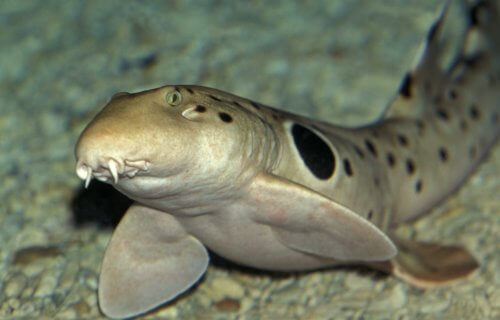TOWNSVILLE, Australia — Some of the ocean’s largest predators may soon be on the endangered species list according to a new Australian study. Researchers report that as climate change continues to warm the planet’s oceans more and more, baby sharks are already beginning to be born smaller, undernourished, exhausted, and into living environments they can barely survive in.
The research team was led by Carolyn Wheeler, a PhD candidate at the ARC Centre of Excellence for Coral Reef Studies at James Cook University and the University of Massachusetts. They closely investigated the impact of warming temperatures on the growth, development, and physiological performance of a group of epaulette shark embryos and hatchlings. These sharks live only along the Great Barrier Reef and lay eggs to reproduce.
“We tested shark embryos in waters up to 31°C,” Wheeler says in a media release. “The hotter the conditions, the faster everything happened, which could be a problem for the sharks. The embryos grew faster and used their yolk sac quicker, which is their only source of food as they develop in the egg case. This led to them hatching earlier than usual.”
Harsh environment for baby sharks
When a hatchling is born prematurely, the shark is smaller, in dire need of immediate food, and lacks adequate energy.

M. Johnson)
Unfortunately, researchers predict that the waters surrounding the Great Barrier Reef will experience summer averages around or even exceeding 31 degrees Celsius (87 degrees Fahrenheit) by the end of this century.
Another big factor in all of this is sharks don’t actually look after their eggs after laying them. That means those eggs must be healthy enough to survive unprotected until it’s time to hatch, which can take up to four months.
It isn’t just egg-laying sharks in danger, though. Researchers say that if the planet’s oceans continue warming at this pace all shark species will be in danger.
“The epaulette shark is known for its resilience to change, even to ocean acidification,” notes study co-author Jodie Rummer. “So, if this species can’t cope with warming waters then how will other, less tolerant species fare?”
A future without sharks?
It’s also important to note that biologists consider sharks to be “slow growing” animals. This means they don’t reproduce as quickly or as often as other aquatic species. This is another element working against sharks as the climate warms.
In conclusion, study authors say future sharks will be born not only in a weakened physical state, but also into an aquatic environment that’s barely tolerable from a temperature perspective.
“The study presents a worrying future given that sharks are already threatened,” Wheeler concludes. “Sharks are important predators that keep ocean ecosystems healthy. Without predators, whole ecosystems can collapse, which is why we need to keep studying and protecting these creatures.”
“Our future ecosystems depend on us taking urgent action to limit climate change,” Rummer adds.
The study is published in Scientific Reports.
